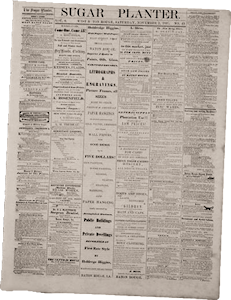Sugar Planter [West Baton Rouge, LA], April 7, 1860
In the March number of DeBow’s Commercial Review we find the following from the pen of Judge Hopkins, of Mobile. It is worthy of the special notice of every man in the Southern States who has interests in the institutions of slavery worth protecting:
If it be desirable to preserve the patriarchal system of negro slavery now subsisting at the South, as the very best basis of social order and of moral and domestic integrity, as well as an agricultural necessity; which none may doubt, who has evoked wisdom and virtue in pursuing the question. Slaveholders should allay this antagonism in their midst, by agreeing, through Legislative action to confine the Negro to the soil, thus to elevate and open up the mechanics trades to the non-slaveholding people around them. Dignify the trades to the level of the professions, in common acceptation, and idling, loafing, lounging, fox-hunting, or, in other word, general dissipation of health, energy, and time, among the young men of the South, would almost entirely cease, and in their place be substituted general and busy industry. By confining the negro to the soil, the mechanic would be at once converted from an open, or secret enemy of negro slavery, into its firmest advocate and supporter, because he would then feel himself lifted up in the scale of social respectibility , and maintained in that position by the subordinated negro confined exclusively to menial services. Before the law and the community, all white citizens would stand strictly on a footing of equality, and be alone distinguished by courtesy and merit.
The southern planter certainly overlooks his true interests when he leaves his fields of cotton, cane, and tobacco, or rice, and arrays himself with his capital in competition with humble white laborers of his own State. The wealthy planter ought to be content with a splendid income from the fertile soil cultivated by his own slaves. When he, with his wealth and credit, monopolizes all branches of industry, and breaks down by his competition even the humble village laborer, he is gradually undermining some of the strongest and most reliable pillars of Southern institutions. The lordly planter, even with his thousand slaves and broad domains, needs stronger backers than his overseer, his family teacher, and his field hands. And if our villages are to be dwarfed by his competition, and he refuses the hand of friendship to those who are struggling to rise on their individual merit—if he absorbs the small plantations in his neighborhood, and refuses all aid to public schools, churches, and enterprises intended to build up other than the mere planting interest of the country he will find in the end that he himself, by contracted selfish policy, has done more to break down the South and the institution of slavery than any of the mad rantings of Northern Abolitionists whom he has been fighting at a distance. The Southern planter in his mad ambition to grasp at immense wealth, may close his eyes to all these facts so long as the threatened evil is not at his very door, but whether he admits the fact or not, the crisis approaches.—This question has already come up before the Legislature of Tennessee, it is agitated in the South Carolina papers, it occupies a conspicuous position in DeBow’s Review, and we hope to see it before all the State Legislatures of the South at an early date. It is, after all, the question upon which is suspended the well being and independence of the entire South.—Planter’s Banner.
